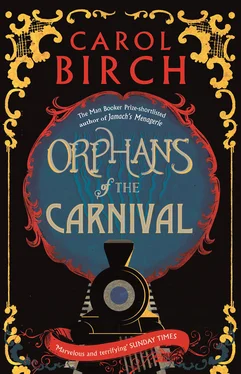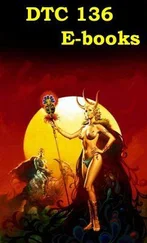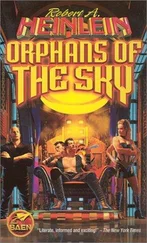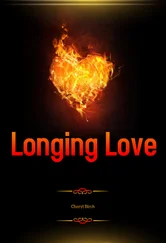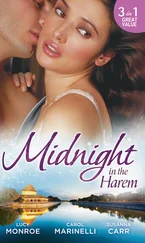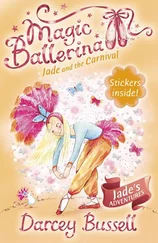Solana came from Zacatecas and had two lost sons, one killed by Santy Ana’s soldiers, the other gone away with them to Texas and never come back. Died at the Alamo because he’d have returned if not, God knows he surely would have returned. Santy Ana was a fat little devil, Solana said. That good man Don Pedro, a great man, a kind man, took me in, and was fair from the first day. While Julia scoured pots and cleaned the sink, Solana told her how it was.
‘He took you in too with your curse, and he wouldn’t have any of us say a thing against it. Got you from the orphanage. And all I know is your mother went out walking in the dark of the moon, and that’s not your fault, and there’s no more to it than that.’
‘Why?’
‘Only God knows.’
‘There may be more people like me.’
‘Not where you came from. They wouldn’t have put you out if you’d been the same as them. You’re from the Diggers, way up there,’ pointing a finger up as if to Heaven. ‘It’s a terrible hard life up there, poor as dirt, but they’re not like you. There’s no more. You’re one of a kind, my love. Your mother wasn’t like you, no one was. Doesn’t make you worse than anyone else. You’re what you are. You’ve still got a soul. Now wash those radishes.’
The courtyard was softly shaded. There was that old iguana Federico on the vine watching her, a wily old beast who’d lived with the family for as long as anyone could remember. It had all been so pretty, the carretelas departing, the padrino escorting the bride, the horses’ manes white, threaded with scarlet. And all the lovely dresses, the orange, the pink, the blue one Marta screamed over. She should have given it to me, Julia thought. She’s got so many, she’d never have missed it. I could have altered it, it would have fitted. She stood up, the blue dress falling around her in imagination, Rates’s words in her head as she climbed to the gallery: Should you decide to make your fortune, Señorita, come and see me in New Orleans . She leaned out, pretending she was behind the footlights in a theatre. A cheering crowd threw roses. The men tossed their hats in the air. Such tiny fine feet, they said.
Yo soy como el chile verde, Llorona, picante pero sabraso …
Still. Not a single one of them would ever love her. Solana had made that clear. ‘I’ll be honest with you,’ she’d said, a long time ago, ‘you can be as good as anyone, and you can be proud and always stick up for yourself and get respect, but there’s one thing you won’t get, nena , and that’s a man. Not with your face so far gone. Don’t expect it.’
‘I know.’
Hadn’t she always?
‘The world’s a cruel place, and there’s nothing fair about it.’
Julia had been about nine or ten, and even then Solana had been very old. She’d taken Julia’s face between her hands and looked fiercely into her eyes and said, ‘Listen, you. It’s not your fault. None of it’s your fault. And you won’t get a man but it doesn’t matter. What’s a man? Same as a woman. Nothing. It all goes anyway. God loves you, and Solana loves you, and your mother loved you, and that’s all that matters. She did it for the best, your mama. Of course she didn’t look back. That would have made it harder for you. She gave you to the vaqueros because she wanted you to have a good life.’
She remembered the vaqueros , big men with wide sunburnt faces, high on their soft-eyed brown horses. They drove three black-spotted cows with twisted horns before them. She’d never seen horses and cattle and men before. They put her on a horse, wrapped up like a bundle, strapped safe to the ripe poncho of a fat vaquero , and her mother walked away. She could say ‘Mama’ by the time she reached the orphanage, that much she knew because they told her so. Mama was in the big mountains. Mama was a kind, surrounding feeling that could bring tears to her eyes if she let it. And Mama was a sharp clear picture, the first memory, her mother’s back walking away from her, with resolution. She’d cried out, ‘Mama!’ But her mother never turned around. Mother’s shawl was sad and frayed. Her pigtail curled at the end under a battered straw hat. Water ran nearby, and the mountains glowed with a light that seemed to flicker faintly at the edge of vision.
Julia had ancient dreams. From the very beginning they were there, before any articulation — dreams that had little of substance, but friendly oceans of feeling. In the dreams Julia was full and warm, and darkness was above and all around, safe. And there were places of great light, where the ground fell away and birds with forked tails flew below her. But it had all gone, whatever it was. The Sanchez household had its own little chapel. When the priest told them about the Garden of Eden, she thought that was it, those mountains into which her first clear memory, the memory of her mother’s back, retreated. The fat vaquero made kind clucking noises at Julia as they rode down into Culiacán, speaking a language she’d yet to learn. The men stared at her, big brown bloodshot eyes all over her face. One of them dabbed himself here and there, thick fingers to the shoulders, the forehead, again and again as they babbled and jabbered, she as strange to them as they to her. She looked back with her thumb in her mouth, clutching her doll and crying. You, Yatzi. They took her away to a place where a woman looked at her and screamed. They tried to give her a proper doll with a painted face, but she didn’t want it, she wanted Yatzi that had come with her out of the mountains, and she screamed when they tried to take him away. They said her mother said she wasn’t her mother. Then again, said the nun, the man said she wept as she handed the child over, and kissed her, and prayed over her. Julia didn’t remember that. Only the pigtail. Then the shadows in the orphanage, the smell of beans and garlic, a wide white staircase rising up to a shady corridor in the Palace, arcaded and tiled in blue and white, and two boys playing a game of cards in their Sunday suits. Their iguana, the one there on the vine, sitting patiently watching from the top of a balustrade. These things were so far away they inhabited a space from which also rose dreams and fairy stories and the things you saw half way between waking and sleeping.
Ay de mí,
Llorona, Llorona — Llorona –
llévame al río –
tápame con tu rebozo, Llorona
porque me muero de frió.
I could get paid for this, she thought.
That’s when she’d known she was going away. But not yet.
Oh Saint Jude, she’d prayed, holy apostle, worker of miracles, close kinsman to Jesus Christ, hear me again, dear Jude, come now to my aid in my great need, bring the consolation and succour of heaven in all my necessities, tribulations and sufferings, and let me be loved like other girls, let me be loved like a human, and I promise to forever remember your great favour and always love and honour you as my special patron and do my best forever to increase devotion to you wherever I go. Thank you, Saint Jude. Amen.
Solana died six months later, and then she was free. She left early one morning, before it was light. Federico the iguana was sitting on the fountain with his face pointing at the moon. No one else was about. The old patio, there it was as it had always been. They were all sleeping. She’d said no real goodbyes, just slipped away. She didn’t think anyone else would miss her very much. Maybe a little. After all, what was she? A servant, moving on. She took a small grip, her harmonica, her guitar, a half round of white cheese, Solana’s old rosary beads and her doll Yatzi.
You and me, Yatzi. You and me .
She heard the lonesome baby cry again, out there somewhere toward the Mississippi. Julia opened her eyes. Myrtle and Delia must have woken her, coming in with whispers and a smothered giggle. They bumped about in the dark, trying not to disturb her. How strange. Far away under this sky it’s all still there. The patio, the stone bench, the fig tree, the shadow of the fountain. She saw it in moonlight, full of broken paper flowers, as it was that night.
Читать дальше
